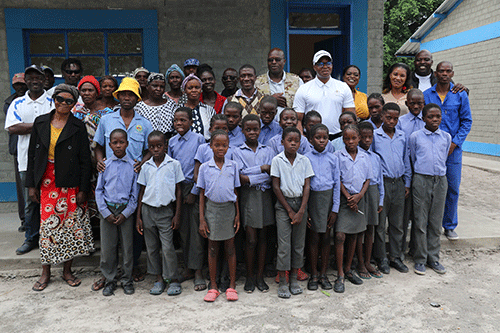ν Marythar Kambinda
Katima Mulilo – The Maunga community in the Chinchimani circuit were filled with excitement on Tuesday after the Development Bank of Namibia (DBN) handed over two classrooms constructed as part of their corporate social responsibility to Maunga Junior Primary School.
The two classrooms were constructed by ZAPP Trading Solution at a cost of N$500 000, and donated by the DBN to assist the rural school, which has 94 learners and was in dire need of extra classes as some learners were either taught in mud structures or in tents.
Speaking at the handover, the principal of Maunga JPS, Susan Museke, expressed her excitement that the construction of the two classrooms had been completed, and that it would help improve the learning environment for the children. She said good infrastructure is important in schools because it aids in the production of good performances by learners.
“These classrooms will improve the attendance of our learners, compared to the mud structure that they normally used. The new classrooms will also help the teachers improve the performance of the region and contribute to the economy of the country,” added Museke.
The DBN’s Jerome Mutumba handed over the new classrooms to the school’s management team, observing that the structures will help learners have a proper and effective learning opportunity.
“When an opportunity like this one was presented, we had to find a way to help the community and get involved. This was an investment into the citizens of Maunga and in the future of learners, as education is important,” he said.
He further called on staff members and learners to take care of the facilities in order to ensure that others would still be able to make use of them 10 years later.
School inspector for the Chinchimane circuit Roscow Lukubwe stated that the donation is highly appreciated, given that “as a ministry, we are unable to provide resources for all the learners across the country because the resources we have are limited.”
The community were thankful, but still asked for further assistance in order to ensure electricity supply to the two classrooms as well as to the teachers’ residences. They further asked for ablution facilities at the school, as there are none.
Additionally, they requested the education ministry to consider upgrading the school to grade seven so that the learners will not have to walk over seven kilometres to the nearest school with upper-primary level.
– mkambinda@nepc.com.na



